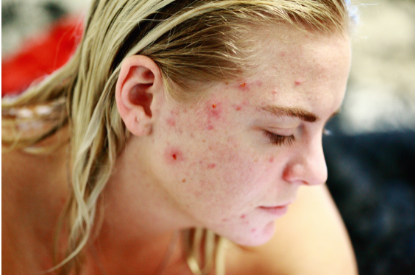Do you have bumps on your face that make you want to cover? Acne is a common skin condition and people experience it in their lifetime. Commonly seen in teens, acne starts when the oily secretions from the skin’s sebaceous glands clog pores, the small openings for hair follicles. Although acne often occurs during adolescence, roughly 20 percent of all cases occur in adults.
Clogged pores can swell, causing inflammations or pimples. Acne can be hard to treat, but with the help of your dermatologist, it’s achievable. Managing acne involves a series of consultations and interventions, including oral medications, topical creams or ointments, and various therapies.
One of the most promising treatments used today is isotretinoin, a derivative of Vitamin A, which is prescribed for those whose moderate or severe acne has not responded to past treatments.
What is Isotretinoin?
Isotretinoin is a strong and effective way to treat severe acne. Commonly known as Accutane, Clavaris, Absorica, and Acnetrex, the drug works by reducing the size of the oil glands. This way, they produce less oil to help maintain skill cell turnover.
The drug may take six or more months to fully treat acne. If acne returns after the treatment, it will not be as bad as it was before. Though effective, isotretinoin can have serious health risks if through self medication. It is important to talk with your dermatologist before the treatment.
Some of the isotretinoin side effects include dry skin, lips, eyes, or nose, headache, back pain, muscle problems, skin reactions, vision problems, and cold symptoms. In rare cases, the drug can cause adverse effects or severe effects, including severe stomach pain, vision or hearing problems, increased thirst and urination, anxiety, depression, signs of liver or pancreatic problems, hair loss, and dizziness due to increased pressure inside the skull.
Do’s and Don’ts of Taking Isotretinoin
1. Consult with a Dermatologist
First and foremost, the most important step to take in using isotretinoin for acne is to consult a dermatologist. The doctor needs to assess the client’s medical history, noting the presence of certain health conditions that may cause severe side effects. These include diabetes, asthma, depression, or allergies.
Further, the doctor may request blood works to make sure it is safe for the patient to take the anti-acne drug. Some of the laboratory tests to be requested include Creatinine to check for kidney function, B-hCG to check for pregnancy, complete blood count and fasting blood sugar, to check for diabetes, SGOT, SGPT, and ALT to check for liver function, and lipid and cholesterol levels.
The doctor may also advise that you stop taking any vitamin A pills before the treatment, since this may aggravate the symptoms of the drug. Lastly, the doctor needs to tailor the drug’s dose based on the patient’s body weight.
Further, inform your doctor if you’re taking certain medicines before you begin treatment. These include tetracycline antibiotics like oxytetracycline, doxycycline, lymecycline, and minocycline. Other contraindicated medicines include acne medicines that can make skin irritation worse.
2. Do not take isotretinoin if pregnant or if planning to get pregnant
Isotretinoin can cause miscarriage, severe birth defects, premature birth, or death of a baby if the mother takes it at the time of conception or during pregnancy. Never use isotretinoin if you are pregnant, plan to become pregnant, or can become pregnant.
For women who are at the reproductive age, they should have two negative pregnancy tests before taking isotretinoin, before each prescription is refilled, and right after the last dose of the drug. Also, while taking the medicine, female clients must use at least two forms of birth control – contraceptives or condoms. This way, it is sure that there will be no conception.
Breastfeeding a baby is also a big no-no when taking isotretinoin. If you plan to breastfeed, make sure you have not taken the drug in the past month.
3. Avoid drinking alcohol while on isotretinoin
Do not drink alcohol when taking isotretinoin. Alcohol when mixed with isotretinoin can lead to inflammation of the liver. Further, it can affect liver function, which can cause serious health effects.
Do not donate blood during treatment
4. Do not donate blood while on isotretinoin treatment
When you donate blood, it’s uncertain who will receive it. If a pregnant woman or an infant will receive the blood, it could be detrimental to their health.
5. Isotretinoin side effects
There are potential side effects of taking isotretinoin. These include acne purging, or it gets worse over the first 4 - 8 weeks, dry skin, lips, palm, and soles, dry red eyes, decreased night vision, nose and gum bleeds, and increased sensitivity to the sun. Since isotretinoin is a derivative of vitamin A, it can make your skin much more sensitive to the sun. While taking isotretinoin, limit all sun exposure and avoid direct sunlight. If you need to go into the sun, make sure to use sunscreen with an SPF of at least 30, even if it’s cloudy. These symptoms are expected to go away in a few days.
If these symptoms do not resolve for more than a few weeks after you stopped taking the medicine, consult with a dermatologist.
Isotretinoin for Acne: Effective but used with caution
Dermatologists will attest to the efficacy of using isotretinoin for acne. People who took the medicine will have smoother and acne-free skin after undergoing treatment.
Though effective, it can have several health effects, so doctors and patients should work together to ensure that all the do’s and don’ts are well understood.
Learn more about acne here.
Article Reviewed by Dr. Zharlah G. Flores, MD, FPDS


